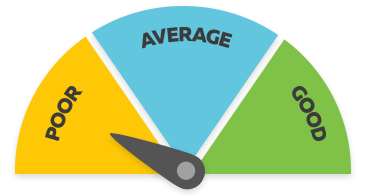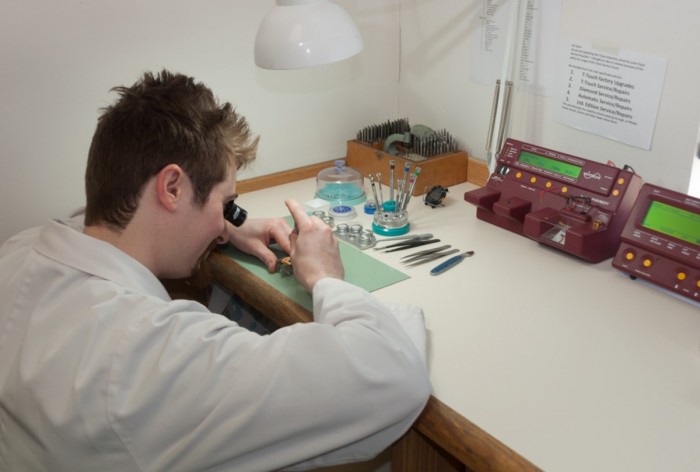Watchmaker and Repairer
Kaihanga/Kaiwhakatika Karaka/Matawā
Alternative titles for this job
Watchmakers and repairers clean, repair and assemble mechanical or electronic timepieces such as watches and clocks.
Pay
Watchmakers usually earn
$47K-$55K per year
Watchmakers running their own business usually earn
$80K per year
Source: Jewellery Industry Registration Board of NZ, 2017.
Job opportunities
Pay
Pay for watchmakers varies depending on skills and experience.
- Apprentices may start on the training or adult minimum wage, or a little more.
- After a few years' experience, watchmakers can earn $55,000.
Watchmakers who run their own businesses can earn $80,000 a year or more.
Source: Jewellery Industry Registration Board of New Zealand, 2017.
- PAYE.net.nz website - use this calculator to convert pay and salary information
- Employment New Zealand website - information about minimum wage rates
(This information is a guide only. Find out more about the sources of our pay information)
What you will do
Watchmakers and repairers may do some or all of the following:
- examine broken watches or clocks to find out what is wrong with them
- remove and repair damaged or faulty parts
- clean, reassemble and adjust timepieces
- test the accuracy of repaired items
- replace glass faces and batteries
- calculate the cost of repairs
- make special parts for antique watches and clocks
- source watch and clock parts online and quote repair work for customers.
Skills and knowledge
Watchmakers and repairers need to have:
- technical knowledge of the way mechanical and electronic timepieces work
- a thorough understanding of how to use and care for equipment used to do repairs
- a wide knowledge of the different styles, designs and manufacturers of clocks and watches.
Watchmakers and repairers who run their own business also need small business skills.
Working conditions
Watchmakers and repairers:
- work full or part-time hours, weekends and late nights. Self-employed watchmakers often work up to 60 hours a week
- work in specialist watchmaker and repairers' or jewellers' workshops, or from off-site workshops.
What's the job really like?
Paul Mitchell
Watchmaker and Repairer
What makes a good watchmaker and repairer?
"I don't think just anybody could do this job. Patience is key. You're working on such small things, and you could go by the book, do everything step by step, but it may still not work right. There's no set model to follow because there are thousands of different types of watches."
What's the hardest part of the job?
"Anything that's really old is challenging. I just fixed a pocket watch that's about 140 years old, worth about $3,000 to $4,000, and it took me about four days' work to get it done. With anything that old, you have to make the parts yourself and there's no guarantee that it'll even work at the end."
What do you like most about being a watchmaker and repairer?
"When you get a really hard piece fixed, there's nothing like it. Like that pocket watch – the guy had brought it to seven other places and they said it couldn't be fixed. Then you think, 'Yeah, I'll give it a shot', and then you get it going."
Entry requirements
To become a watchmaker and repairer you need to complete an apprenticeship under the supervision of an established watchmaker and repairer and gain a New Zealand Certificate in Watch and Clock Making (Level 4). Apprenticeships usually take about four years to complete.
The Jewellery Industry Registration Board oversees watchmaker and repairer apprenticeships.
- Jewellery Industry Registration Board of New Zealand website - information on apprenticeships
- NZQA website - qualification overview for the New Zealand Certificate in Watch and Clock Making
Secondary education
There are no specific secondary education requirements for this job, but English, maths and science to at least NCEA Level 1 are useful.
Personal requirements
Watchmakers and repairers need to be:
- accurate, with an eye for detail
- good at problem solving
- quick and efficient
- practical
- patient.
Useful experience
Useful experience includes:
- precision repair work, such as repairing jewellery or appliances
- electronics work
- work in an engineering workshop.
Physical requirements
Watchmakers and repairers need to have good eyesight (with or without corrective lenses), as they have to work with small, delicate parts.
Good hand-eye co-ordination and steady hands also help.
Find out more about training
- Jewellery Industry Registration Board of New Zealand
- www.jirbnz.org.nz
What are the chances of getting a job?
Watchmaking and repairing a small but stable occupation
According to the Jewellery Industry Registration Board of New Zealand the number of watchmakers and repairers has remained relatively steady over recent years.
According to the Census, 138 watchmakers and repairers worked in New Zealand in 2018.
Limited watchmaker apprenticeships available
Watchmaker apprenticeships are hard to come by, with only six people doing watchmaker apprenticeships in 2017.
Placements are limited because most employers are small businesses with a set number of benches, and positions only open up when apprentices become qualified and move on.
You can increase your chances of getting an apprenticeship by:
- making contacts through events organised by the New Zealand Horological Institute (NZHI)
- going to your local watchmaker and repairer and asking about apprenticeship opportunities
- being able to show that you have a talent for mechanical repair work.
Fashion trends create demand for watchmakers and repairers
Wearing watches is still popular, and it has become fashionable to wear large watches. These trends create demand for experienced watchmakers and repairers.
International demand for experienced watchmakers and repairers is also strong.
Types of employers varied
Some watchmakers and repairers work in:
- watch repair shops
- jewellery shops.
Many watchmakers and repairers run their own business. They may deal directly with the public, or operate as trade-only agents who fix items for retailers.
Sources
- Harrison, G, industry commissioner of apprentices, Jewellery Industry Registration Board of New Zealand, Careers Directorate - Tertiary Education Commission interview, June 2017.
- Jewellery Industry Registration Board of New Zealand website, accessed June 2017, (www.jirbnz.nz).
- Stats NZ, '2018 Census Data', 2019.
(This information is a guide only. Find out more about the sources of our job opportunities information)
Progression and specialisations
Watchmakers can progress into supervisory or management roles. They can also establish their own business and become self-employed.
Last updated 3 April 2023


